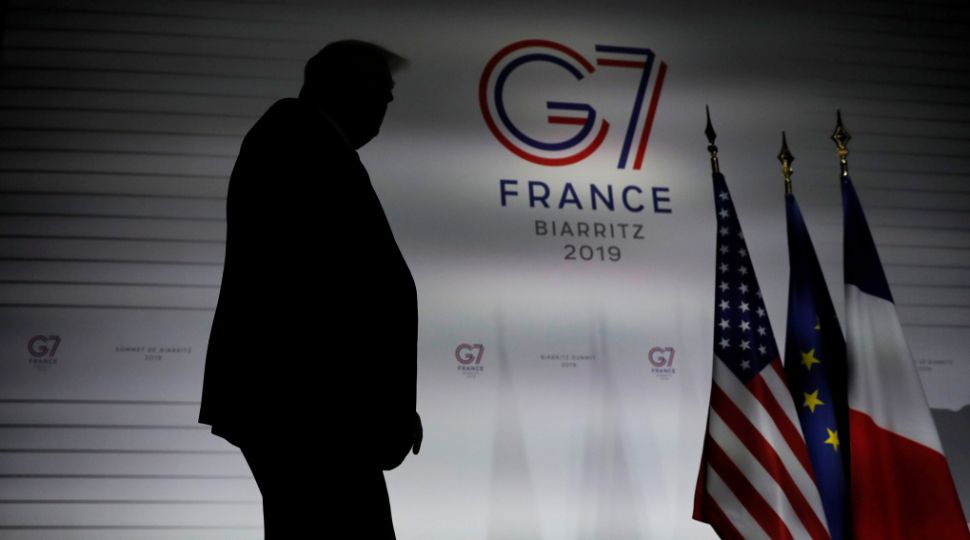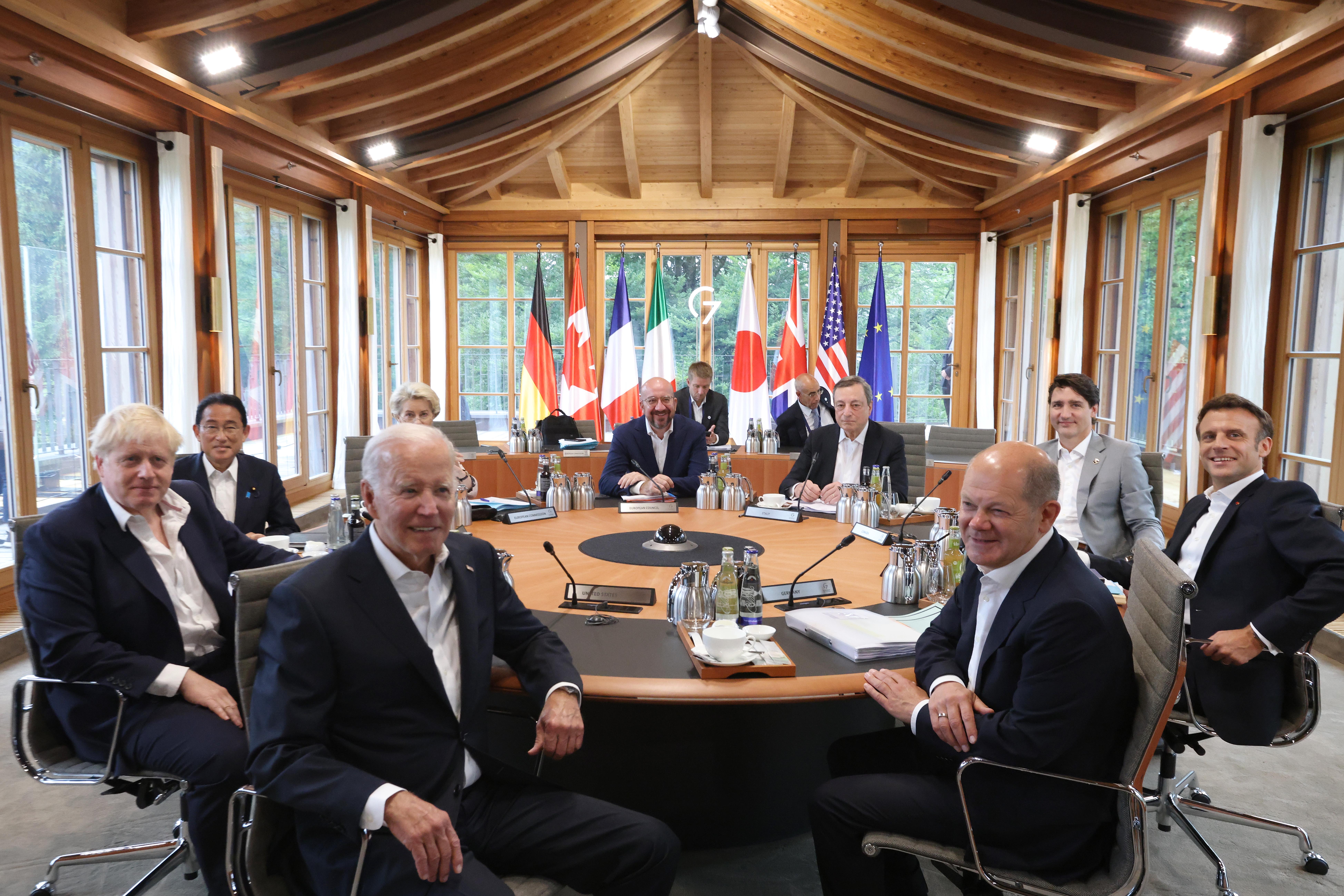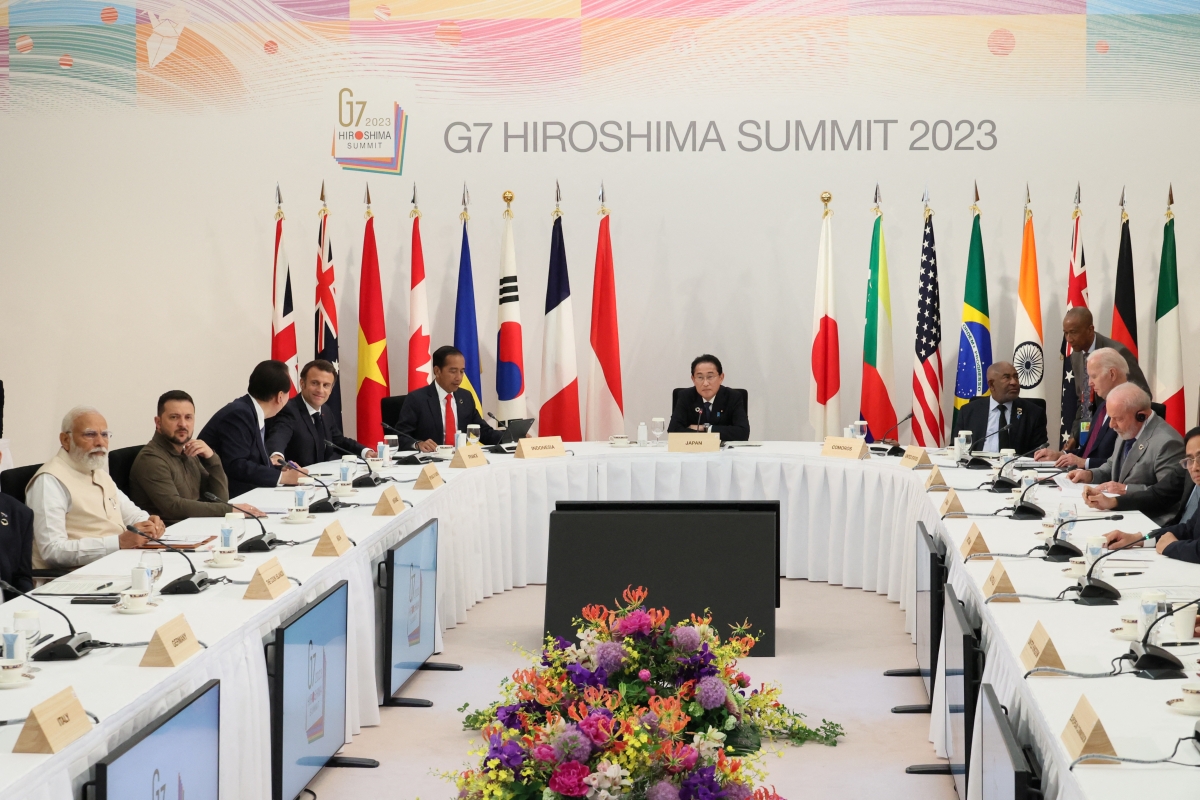G7 Summit in Italy: In Search of Solutions to Conflicts and Global Problems
The G7 summit, held 13-15 June at Borgo Egnazia in Apulia, brought important decisions on support for Ukraine, including the creation of a financial mechanism using frozen Russian assets. In addition, the U.S. and Japan signed security agreements with Ukraine. Members of the group also announced increased cooperation on migration and combating unfair trade practices, among other issues. Important for the implementation of the G7 announcements will be cooperation with other partners, including developing countries and states where Russian financial assets are located.
 Louisa Gouliamaki / Reuters / Forum
Louisa Gouliamaki / Reuters / Forum
The meeting of G7 leaders in Italy took place just after the conference on the reconstruction of Ukraine, which was held in Berlin on 11-12 June and before the peace conference, which took place on 15-16 June in Switzerland. The coincidence of the dates may indicate an aim to increase international support for Ukraine, for the group to present new initiatives to support the country in its fight against Russian aggression, as well as the goal to develop proposals for further assistance, which could be discussed in a wider group. In addition to the leaders of the G7 countries (Canada, France, Germany, Italy, which holds the group’s one-year presidency, Japan, the UK, and the U.S.) and the EU (which is a regular guest at the summits), the meeting was attended by the leaders of 11 countries, including India, Brazil, Turkey, and Ukraine, and Pope Francis. This signalled an emphasis on relations with developing countries, which are often ambivalent about the war in Ukraine. The summit was also attended by the heads of five international organisations, including the UN, the IMF, and the African Development Bank.
Decisions on the War in Ukraine
The G7 countries once again reaffirmed their “unwavering” and multifaceted support for Ukraine, which is important in the context of the difficult situation of Ukrainian troops on the frontline. The most important outcome of the meeting was the decision to launch a loan mechanism, under which the group is expected to raise about $50 billion on financial markets to support Ukraine. Repayment of these funds will be secured by the interest on Russian capital frozen in EU countries, among others (the total is more than $300 billion, generating about $3 billion in profits annually). The G7 is to cooperate in this regard with the individual countries where the Russian funds are located. The money is to be used for a variety of purposes, both civilian and military. The group’s decision is a compromise between the demand for the seizure of Russian assets and their transfer to Ukraine (as sought by the Ukrainian authorities), and the more restrained position of, among others, international institutions, including the ECB, fearful of breaking global financial rules. The mechanism is expected to be activated at the end of this year. The G7 also said it would take action, including imposing sanctions on third-country entities, such as those from China, Iran, and North Korea that, among other things, support Russia’s war industry and help it evade sanctions, including in the trade of energy resources.
On the sidelines of the summit, U.S. President Joe Biden and Ukrainian President Volodymyr Zelensky signed a 10-year security cooperation agreement. It is intended to provide Ukraine with long-term support from the United States in, among others, arms production in cooperation with American industry. Ukraine has also signed a similar 10-year agreement with Japan (the official name of it includes “support” and “cooperation”, which is related to Japanese domestic policy). It includes support in the spheres of defence (without arms transfers), humanitarian and financial aid, among others.
Other Outcomes of the Summit
In addition to the war in Ukraine, migration was an important topic of the leaders’ talks, as emphasised by Italian Prime Minister Giorgia Meloni (these issues are also important ahead of the July parliamentary elections in the UK and the November presidential elections in the U.S.). The group’s members pledged to cooperate in this area, including reducing the causes of migration, managing borders, and combating smuggling networks. Cooperation is also to be developed with migrants’ countries of origin and transit. The leaders also endorsed an immediate ceasefire in the Gaza Strip and working toward a lasting peace through a two-state solution. They further condemned Houthi attacks on ships in the Red Sea. They also inaugurated the “Energy for Growth in Africa” initiative to develop green energy, and declared a commitment to expanding sustainable infrastructure on the continent. They announced an increase in World Bank funding by $70 billion over the next decade to support developing countries, and called on the international community to resolve the debt problem of this group of states (this is directed at, e.g., China, which has become a major creditor in recent years).
The G7 advocated support for free and fair trade and combating non-market trade practices, including subsidies and overproduction, which negatively affect the competitiveness and economic security of its members. These demands can be read as a reaction to China’s economic policies, which include strong financial support for Chinese companies. To enhance economic security and reduce the threat of economic coercion from third countries, the group is expected to continue to diversify its supply chains (mainly concerning strategic goods and raw materials—the G7 aims to identify them together, which would enable better coordination of activities) and implement derisking, which is the reduction of dependence on, mainly, China. It has also expressed a commitment to a “free and open” Indo-Pacific, a response to China’s aggressive actions in the region, including against Taiwan and in the South China Sea. At the same time, the G7 announced to seek “constructive and stable” relations with China. The leaders supported changes to the international tax system, including full implementation of the corporate tax spelled out at the OECD and G20. In response to the triple environmental crisis—climate change, pollution, and reduced biodiversity—the leaders pledged to come up with ambitious plans to lead global efforts in this domain. They announced cooperation on the safe use of artificial intelligence, and presented initiatives to increase food security and gender equality.
Conclusions and Outlook
The summit’s findings on support for Ukraine are important for its ability to repel Russian aggression and maintain functioning state structures. They demonstrate to Russia that tough partners’ support for Ukraine will be maintained. It also has symbolic significance by showing that the aggressor will not only have to bear responsibility for its actions, but is already indirectly funding the defence of the invaded country. However, the pace of implementation of the decisions will be important, including accelerating the activation of the loan mechanism so that it affects the situation on the frontline as soon as possible. It will be vital for the success of the G7’s plans to work with countries in whose jurisdiction are the frozen assets, among others, of the Russian central bank, including Belgium where most of these funds are pooled (mainly in Euroclear, an institution that provides services to the financial sector). The mechanism is intended to act as a backstop for financial support to Ukraine in case Donald Trump wins the U.S. presidential election this fall, as he may seek to reduce such aid. It is worth noting that the introduction of the mechanism may block frozen Russian financial resources for the next few years. Thus, they might not be able to be fully utilised in rebuilding Ukraine after the war. Russian President Vladimir Putin called the G7’s actions “theft” and noted that it will not go unpunished. Retaliatory actions against European companies still present in Russia, for example, can be expected. It is estimated that their assets are worth more than €30 billion. Security agreements with the U.S. and Japan, which will enhance Ukraine’s long-term defence capabilities, are important. However, the G7 members have not received a declaration from crucial countries of the Global South, including India and Brazil, regarding their attitude toward Russia’s policies. They will continue to be neutral on the war in Ukraine and maintain economic relations with Russia.
On other international issues, the strengthening G7 cooperation on migration and combating organised smuggling can be considered important. While this may increase the efficiency of security services, it should take into account respect for international law, including in the area of asylum (the UK and Italy are introducing controversial mechanisms for relocating asylum seekers to third countries, Rwanda and Albania, respectively). It should also be taken into account that the support of migrants’ countries of origin in terms of, for example, improving public services and creating jobs, may in the medium term increase migration pressure due to improvements in the material situation of some residents, and thus greater opportunities for movement. It is also important for the G7 to put pressure on Israel for a ceasefire and a two-state solution, which may influence the Israeli authorities’ political calculations. Coordination of G7 actions on the issue of unfair trade practices may increase the effectiveness of the protection mechanisms of their markets, for example, in the context of the large scale of subsidies of Chinese electric vehicle manufacturers sold in the EU, among others. This is important from the perspective of the Polish economy, which is strongly connected by supply chains with the largest EU markets, mainly Germany. Important for gaining greater favour among developing countries for G7 policies will be, among others, the fulfilment of the group’s announcements on debt reduction, increased financing by development institutions, and climate commitments.





